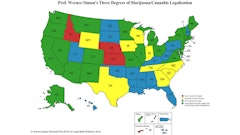
In the wake of the second health alert issued in Oregon for pesticide-tainted cannabis, growers and dispensaries face potential reputation damage for distributing and selling contaminated product. With the industry already facing scrutiny from government regulators, the media and wary consumers, operating day-to-day in a crisis-preparedness culture is more important now than ever.
Companies can spend years building a reputation and developing a customer base for their strains and then watch both deteriorate in minutes when contaminated product hits the streets. In Oregon's most recent health alert, state regulators are withholding the names of growers that distributed strains of Dutch Treat, Pleeze and Dryzl with irregularly high levels of pesticides spinosad and piperonyl butoxide, but the selling dispensaries are faced with the first phase of a crisis situation with customers being told to return the dangerous product to where it was purchased.
While the state investigates how the strains in question, after testing high for pesticides, ended up packaged and distributed by the producer, those producers should be preparing themselves for regulatory sanctions and a public-facing crisis situation with potentially significant media interest.
A cannabis business should look at every aspect of its growing and manufacturing process from seed-to-sale to determine where its greatest risk exposure is.
What happens when that first reporter calls? When that first Tweet goes out naming the producer that sold contaminated product? When the story hits the papers, Internet and airwaves alerting consumers to what the potential hazard was? Operating a cannabis business in a crisis-ready culture can often prevent things like this from happening or, in this case, prepare you for how best to react.
What does operating in a crisis-ready culture in the cannabis industry mean? Let’s look at five steps growers, producers and product manufactures can take to instill a crisis-preparedness culture in their day-to-day operations.
1. Anticipate the crisis
Conducting regular risk assessments and vulnerability audits can help any organization learn where they are most at risk for a crisis occurring. In some cases, this exercise can help prevent the crisis from occurring, and in other cases it can help with beginning to craft a response for when it happens.
Most issues that turn into crisis situations are known in advance. A cannabis business should look at every aspect of its growing and manufacturing process from seed-to-sale to determine where its greatest risk exposure is. The producer(s) in question in the Oregon case should have had protocols in place to immediately separate and destroy tainted product, and, if not, the absence of those protocols would have been identified and corrected during this evaluation process.
2. Identify your Response Team
Select a group of senior-level executives that you want sitting around the table making the critical decisions to navigate your way out of the situation you’re in. This Crisis Response Team should consist of a leader, typically the CEO, and members representing different areas of the organization, such as public relations/marketing, production, legal and security.
When legal is involved, it is important to distinguish the difference between a legal response and a public-facing response, as they are often points of conflict and different. The go-to legal strategy is to say nothing and never admit guilt as it can be used against the company should a lawsuit arise from the crisis.
A public-facing response will usually accept responsibility as consumers want to know how it happened and are looking for assurances it won’t happen again in the future. There can be different people on the overall response team who get selected based on the issue and the response that will be needed.
3. Identify and Train Spokespeople
It is important to have a single, approved and designated voice for any crisis situation. This person needs to have the appropriate skills, a title that comes with authority and the proper training to know how to handle media interviews.
Professional media training is essential as it coaches future spokespeople on the best ways to interact with the media to quickly put the crisis behind them. Lessons on how to develop and stay on message, how to transition from the questions you don’t want to answer and how to interview for different mediums (print/radio/TV) are typically covered in any basic media training.
The trainee is always put on camera and recorded so they can review their performance and continually work on their interviewing skills. Crisis interviews can often consist of an intense line of questioning where it is critical to remain calm and respond appropriately.
An example of intense questioning would be in the recent Wells Fargo Bank scandal where the CEO was continually asked how much money he benefited from personally, if he would give it back and if he would resign his position over the incident. He maintained his composure and bridged his answers to effectively get through the interview.
4. Prepare to Accept Responsibility and Apologize
The biggest mistakes in crisis management are often made by companies that deflect responsibility to avoid apologizing. In a recall or product-contamination situation, the burden of responsibility falls on the source of the product, period. The cultivator must own that responsibility and acknowledge that they made an error in letting that product be distributed.
It’s equally important to convey that new policies are in place to prevent it from ever happening again.
Likewise, in retail situations, accepting responsibility is critical for things like product or compliance issues.
A great example of this is Colorado’s Strawberry Fields Dispensary, which got caught in a local sting selling to minors. The owner quickly and publicly accepted responsibility, terminated the employees involved and thanked local authorities for running sting operations to keep the community safe and cannabis products out of the hands of those not eligible to buy them.
5. Run Crisis Simulations
Having your Crisis Response Team run through mock situations to test your organization's protocols is an important exercise to familiarize your team with the different steps of effective crisis management and to prepare them for fast action should a real crisis arise.
The team should test their skills of time-efficient information gathering, message development and response team activation.
In other words, identify at what point the crisis response team should be gathered and the spokesperson should begin crafting a response to the looming crisis.
This should be done on a regular basis, simulating the different issues that were identified during your initial risk assessment. Spokesperson mock interviews should be recorded and reviewed to assess where there is room for improvement in real crisis situations.
Most crisis situations are unexpected. With Oregon withholding the names of the companies behind the contaminated product, the producers of that product have time to prepare. That’s unusual. Even companies that are the most prepared make mistakes.
Knowing when to sound off the internal crisis alarm and quickly activating your team to respond is the best way to get the crisis behind you and protect your brand.
Being prepared for something like this is like buying insurance. You hope you’ll never need it, but when a situation arises that you do, you’ll be thankful that you have it.






















